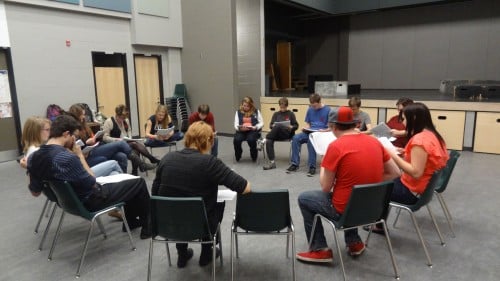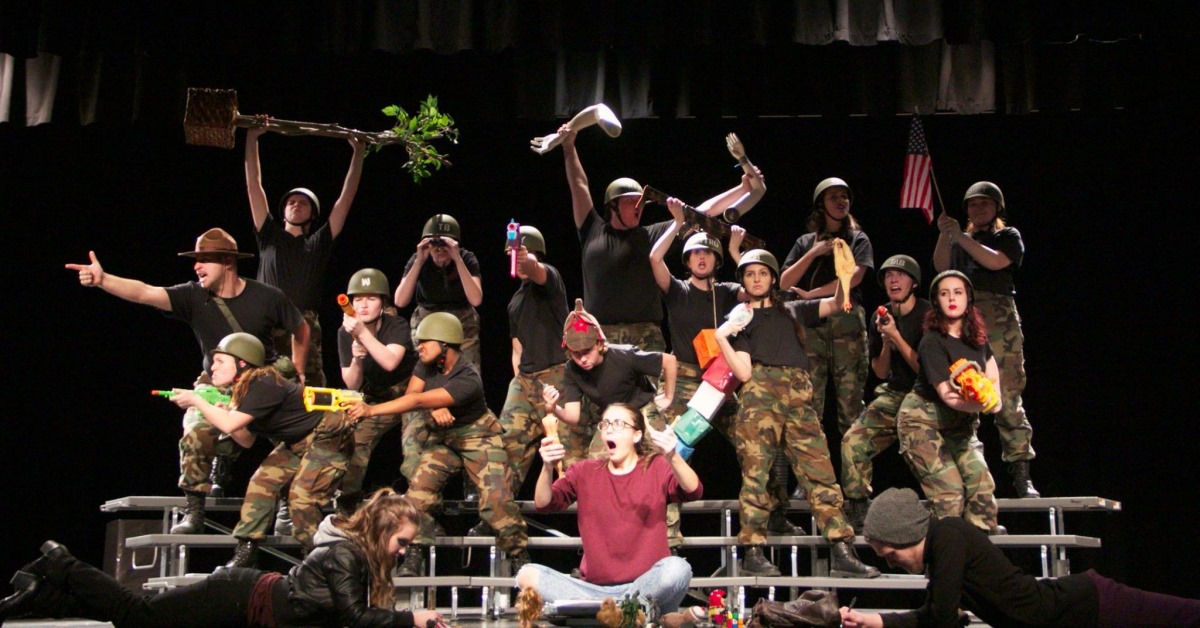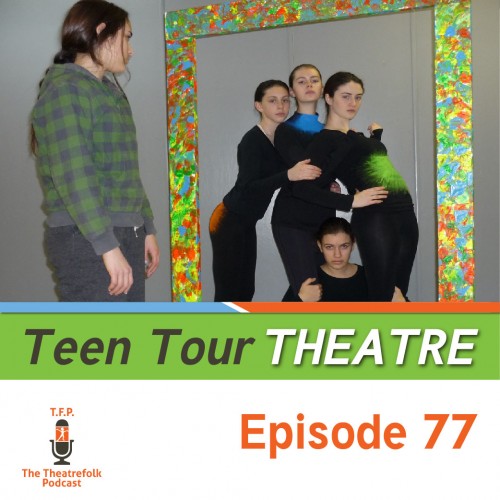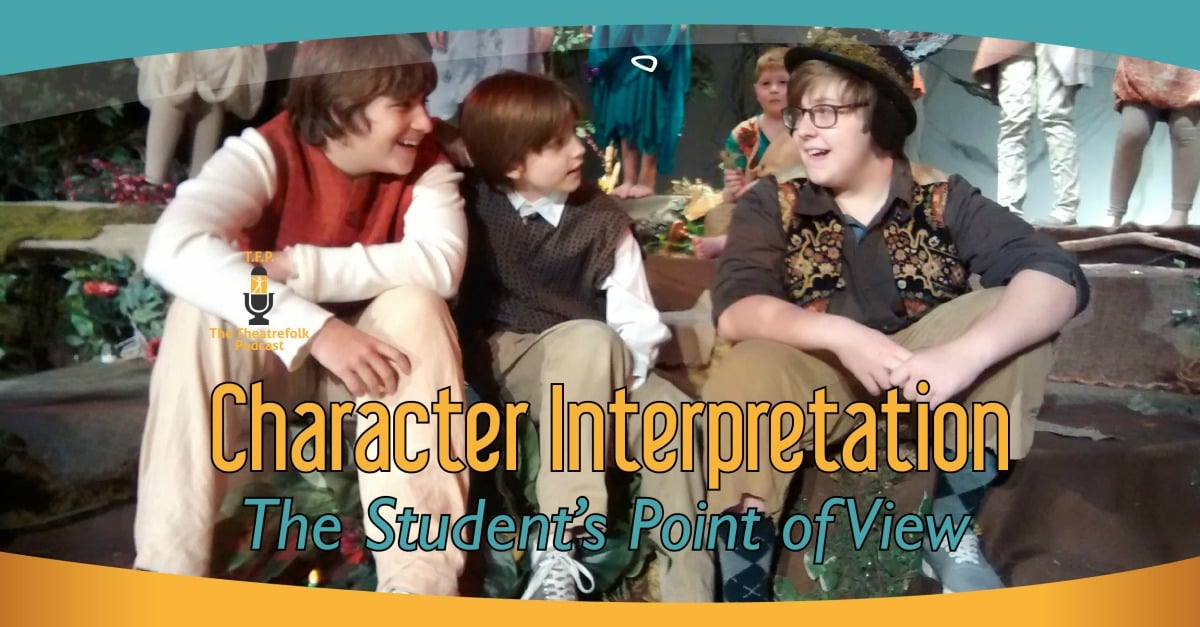Workshop Q&A
Episode 27: Workshop Q&A
This past fall Lindsay spent a week working on a new play with students. On the last day she lead a Q & A with them about the process and the play. The students asked some amazing and insightful questions and kept Lindsay on her toes!
Show Notes
Backspace by Lindsay Price
Subscribe to The Theatrefolk Podcast
Episode Transcript
Lindsay: Welcome to TFP, The Theatrefolk Podcast. I’m Lindsay Price, resident playwright for Theatrefolk. Hello. I hope you’re well. Thanks for listening.
Today we have a Workshop Q and A, Question and Answer. But first, let’s do some Theatrefolk news.
So the Q and A is all about my latest play, Backspace, which is a brand new play, can be found in the Theatrefolk catalogue, and so that’s make it news, ta-da! You can find it on Theatrefolk.com, where you can read sample pages and get a sense of this weird little thing. Backspace takes place in a world where the writing process is like going to war, and the play is unique, I guess unique for the 21st century anyway, because I wrote the first draft on a manual typewriter, and the act of writing on a manual typewriter is what brought the play into being.
I love it. I wrestled with it for a long time. I had triumphs in figuring out how to theatricalize this concept. I had defeats, crashing defeats where the play almost got chucked out a window. But you know, that’s the way it is with the writing process, and if you give up, then you’re not writing. And writing isn’t always pleasant, and I don’t give up, which I think [laughs] is probably my best attribute and my worst attribute as a human being.
Lastly, where, oh where can you find this podcast? We post new episodes every Wednesday at Theatrefolk.com and on our Facebook page and Twitter. You can find us on the Stitcher app, and of course, you can subscribe to TFP on iTunes. All you have to do is search on the word “Theatrefolk.”
Episode 27, Workshop Q and A, Question and Answer. So I did an extensive workshop for Backspace at a high school in Northern Ontario this past fall, and at the time the play had a different name and was actually a full-length, and it was because of the work that these particular students did that I was able to, well, if you want to get artsy-fartsy about it, that I was able to find the true nature of the play. And now, it’s something I’m really proud of. It was a difficult—in a good way—play to write, and it just is very satisfying that at the end of the process there is a product out there in the world that I can feel proud of. Yay! [Laughs] There’s some English for you.
These students are the bomb. I loved working with them. I worked with a grade 9, a grade 10, and a grade 12 class, and they were so quick and they dove into the world of the play, and the world of the play was not normal, and you know, after a couple of cursory what-are-we-doing glances they just went, “Okay,” and they did it all full throttle.
And so here at this Q and A, we have the grade 12 class, and it’s at the end of the week and after we’d been through everything, and we just sort of sat around and talked about the play and the writing process. And one of the questions really put me on the spot, you know, “What do I want the audience to take away from this play?” And it was awesome that it was asked of me because it’s something I ask of writers all the time, “What do you want? What is the end purpose of this play when the audience is sitting there and then eventually leaving?” And it’s a really important question to know the answer to, and it was this question that really made me hone in and focus on what is the final version of the script.
So the sound is a wee bit wonky because we were in a cavern of a room, but I still think it’s an interesting lesson. And I’m loud anyway, because I’m always loud. Okay, here we go.
[00:04:30]
Lindsay: Questions. What questions do you have? Yes?
Question 1: I was wondering this throughout the whole thing so what inspired you to take this like problem that every writer faces and then use it to your advantage?
Lindsay: Well, it’s my job if I’m going to write a play to sort of deal with the problem theatrically. So I always knew that to take the struggle of the writer that I have to find a theatrical way of doing it, and it just seemed to me that when I was—so I bought a manual typewriter. I don’t think I told this story with the grade 12s. But I bought a manual typewriter because I have done everything on computer and I wanted to see what it was like to create something on something that didn’t have any technology attached to it, and literally pounding on the keys, it’s like a fight, like you have to really fight with the machine, but it’s also very exhilarating, and that to me very instinctively seemed to be like war, that it’s very exhilarating for some and also such a struggle for some.
And just that was the start of it, like how do I take the struggle of being a writer and turn it into war, and then how do I take a war play, how do I make a war play, and particularly with the battle scenes, which seems very cinematic, and make it theatrical? And so that was kind of the steps to it, and then it was pretty easy to take a look at the journey of some rookie writers and then see what happens to them throughout the play.
Hi!
Question 2: With a play like this and it’s very like, it’s based on your mindset, like how your mind thinks through all this, how do you start writing? Like where did you start?
Lindsay: I spent an entire month just banging every day on this manual keyboard, and just things just started to come and I thought, “This works really well with the struggle of being a writer,” So I just took a look at what are some of them, you know, what are the struggles dealing with writer’s block, dealing with the blank page, dealing with this, the whole notion of people have this preconceived idea of what being a writer is, you know, screenwriters are like this—it’s a very common thing that, oh, screenwriters are those, particularly a certain type of screenwriter, it’s not real writing—or like people think of poets in one way and novelists in another way and playwrights in another way, and just started to bring those concepts to life through character. Because that’s the way that I like to write, is to bring concepts to life through character.
Hi.
Question 3: Why did you choose to end the play with the typewriter scene, like being optimistic and winning?
Lindsay: Because I think that’s the way that war movies end. They end with a successful fight. And I thought that in the majority of…we saw who the failures were. I didn’t need to end with their failures. I wanted to end with a success. So I thought a battle scene, ending with a battle scene, was the way to go.
Hi.
Question 4: Do you relate, like do you base your characters on real people you know and like that?
Lindsay: Do I base my ideas on real characters? You know what, I don’t know if this is a good thing to say or a bad thing to say, but it’s really all my imagination. I make them all up. So that means that there are a lot of people living in my head, of varying types.
Now, there are different types of people. I like to write Tyros, I like to write sarcastic girls, and then I like to write Fledges. I like to write a little bit goofy boys, particularly at the high school level. I think those are good characters to write. I like to write characters who start out as stereotypes and then completely belie those stereotypes. I like to write characters who are just completely off the grid who are like the norm.
So, while I don’t base them on real people that I know, I do take types and then I like to turn those types on their ear.
Question 5: Do you have like a process or something that you get into like the movement of writing or is it just come naturally?
Lindsay: You know what, it’s a really big fallacy that writers are always inspired to write and that we love writing every day and that we sit with scarves around our necks and like big plays like unicorns just sort of like leap out of our heads and it’s all sunshine and… There are a lot of days where you don’t want to write at all but you have to get the job done. So there are lots of tricks to do that, most of which is to get words on the page. There’s one carriage says at one point, “Words on a page, I know how to do this. You have to get words on a page,” and literally that’s what really being a writer is.
And you have to acknowledge the fact that not all those words are going to be good or perfect. In fact, at least 60% of the time they’re going to be pretty crappy. And it’s the practice of knowing that if I spend an hour writing something that’s not very good, I will at the end of that hour maybe get on to something that is better, and then if I keep at it, then I’ll get on to something great.
What happens a lot of times is people stop in that first hour and they’re like, “Well, I suck, so I’m going to stop.” And if you stop on page one, you will never know what happens on page eight. And that is by far the trick of being a writer, is that you write crappy from pages one to seven to get to the good thing on page eight, and that you just keep doing it. It’s always better…
And also, I don’t get too caught up in, “Oh, I have to write like six hours every day.” I don’t write six hours every day. Like this week I was lucky, because I’m working on a new play, and I was really lucky if I got a good 15 minutes. But I got 15 minutes every day, you know? So I’ve been able to move forward. And that’s way better, 15 minutes every day is way better, than an hour once a month or two hours once a month, you know what I mean?
Question 6: What impression do you want the audience to leave with when it comes from war and rape?
Lindsay: That is an excellent question! And I don’t know if I know the answer to that question yet because writing it, I was just really into the experience. I just thought, “Wouldn’t this be an interesting experience?” So that’s kind of where I am. And now that I’ve seen it on its feet, I feel really happy. I think that I’m moving in the right direction and I think that as a piece of theatre that it works. Nobody, particularly in the grade 9’s and 10s… Grade 9’s and 10s are a really great sort of testing ground if you throw something weird at them, and either if they jump in and they like it, then you know you’re on the right track, and they don’t go, “I don’t know what this is. What do I do with this?” you know? So you know that that’s…maybe you’re not on the wrong track.
What I want when I write is I’m really interested in dropping people into a world they haven’t been in. So I think that’s what this accomplishes really well. And I also think about who’s going to perform the play and giving them an opportunity to experience characters in a world they’ve never been in, and that I think is…I’m accomplishing that really well.
So I think that in a very roundabout way, what I want an audience to experience is to have a theatrical experience that they’ve never had before but they also might relate to because the characters act in a human way even if nobody in the audience is a writer, if that makes sense.
Hi.
Question 7: Would you say that from originally when you had made the script…
Lindsay: Yeah.
Question 7: …writing it down and from when we were actually up on our feet that the largest chunk of your stage directions were made now, like when you actually see it?
Lindsay: Yes. Yes, because I make stage directions that I just make them up in my head, and then there’s a little stage in my head and I sort of go, “Okay, that’s going to work and that’s going to work,” and then you get people, you get human beings involved, and it doesn’t work and the timing isn’t quite right. And the cage scene with the amoeba is a perfect example of that, and it was another reason why I wanted to record it, because I think the stage directions for that scene are completely going to change based on what you guys did. So it always helps to have…and that’s why workshopping is so important to sort of get people moving and to see what happens when actually there are human beings.
Question 8: Do you go through a lot of different like from the first time the initial script that you have after writing it and then you editing it and before you come here, do you have a lot of different…
Lindsay: Steps? Yeah. Depending on the script I can go through as many as three drafts before I think it’s ready to be in front of an audience. Sometimes, if it is a less complicated script, it could only be one, but my one drafts are very complicated, like because I do all of my…I start everything with pen and paper, and there’s that whole experience where I’m not really censoring myself, I’m just getting everything down on paper, and then I know at some point that I’m tired of writing and I know I move on to computer, and then I’ll go through it at least two times before I think it’s suitable to be called a first draft.
So it depends on the play and it depends on, you know, this is a bigger piece. Sometimes my plays are only half an hour long and they take less time.
Question 9: The Raw Ideas, I was just like really wondering about them because like at one point there’s like the amoeba…
Lindsay: Yeah.
Question 9: …and other times they’re like articulate people who walk around trying to confuse the enemy…
Lindsay: Yes.
Question 9: Why don’t the writers find it weird when suddenly someone just shows up that they don’t know?
Lindsay: Because I think that’s what secret agents are really good at, just blending in.
Question 9: And just like speaking at one point was like you’re really clean.
Lindsay: Yeah. Well, and there’s also the idea that we have a preconceived notion of what the enemy is like, so I think that when the amoeba are raw and spiky, that’s how the writers perceive them too. I think that that is what I’m going for, is that there’s an idea about how ideas are perceived, and then maybe how they truly are.
Oh, we’ll go here, here, here. Yeah.
Question 10: In the second act, you mentioned going raven a lot.
Lindsay: Yes.
Question 10: What does that mean?
Lindsay: Raven is leaving writing. I’m not sure that’s explained in the script.
Question 10: But not like… that is in your creation.
Lindsay: Yes.
Question 10: Okay. Yeah.
Lindsay: It’s raven as in going a little mad, as in going Alexander-Poe raven. Edgar-Allan-Poe raven.
Question 10: [Laughs]
Question 11: And there’s a Hemingway moment as well, which…
Lindsay: Is an award.
Question 11: Yeah.
Question 12: I was wondering when exactly the war is taking place, because I know it happens with the typewriters a lot, and I know when the bombs are going off that’s a symbol of war, but there’s not really like a direct scene when the writers are fighting, it’s always just a conscience thing that is happening throughout the show.
Lindsay: The play takes place in the future that is next week and a little to the left. So… [Laughs] A parallel… It’s sort of a… It’s not our reality, so it’s a little left of our reality, and it doesn’t take place today or yesterday. It takes place tomorrow.
Question 12: Oh, okay.
Lindsay: A little bit in the future and a little bit not in our reality.
Question 13: Do they ever like physically type the ideas or…
Lindsay: No.
Question 13: …is it just in their mind?
Lindsay: Yes. Because that’s where writing happens. Yeah.
Question 14: I know we didn’t see the full thing together, but the one scene when Squeaky and I’m not sure the name of his character are sitting down, and then Jordan came and bumped into us…
Lindsay: Yes, again…
Question 14: How does that scene relate to the overall picture?
Lindsay: It relates to the overall picture because what I’m looking for gradually throughout is that the opening just sort of represents, particularly with the first last night party, is that writing and going off to war is this really awesome thing and all of us are going off to do this really awesome thing, and we all have the same thought about what it means to go to war, and that character has a completely different impression about what it means to go to war, and that in fact, no, there is not just one straight line between A to B. It is A, zigzag this way, zigzag that way, and what I’m hoping the characters learn throughout is that they learn that it’s not…to get to success is not just a straightforward line, “Oh, I’m going to go to war and it’s going to be great,” “Oh, I’m going to go to war and I’m not that good at it,” or “I don’t like it,” or “My perception of war is completely different than what I’ve been taught ever since I was a child. And he, as we learn later, you know, he has a completely different impression because he has a brother who went to war and was basically tossed out on his ear when times got tough.
So that’s what…it’s a…to have this tea party where everyone is like, you know, being so civilized and sipping tea, and this guy comes in and sort of yells at everybody, just sort of jars. So that’s what I…
Yes.
Question 15: The echoes in act two is you have a certain intention for the audience or was that more just like…
Lindsay: When that would be staged, I see that… Well, I just see it as brain fog. So I see that as a scene where it’s just like in the middle of a forest where nobody quite knows what they’re doing. It’s the epitome of the struggle that all the writers are going through, and it’s the point where they either make the right decision or the wrong decision. Like Rookie comes up with Confuser and is like, “I’m not confused. I know exactly what I’m doing. I maybe not be as strong as I was, but I am not confused.”
Question 16: I noticed from the group of characters like Fledge and all that at the first party, they were very conjoined and playful…
Lindsay: Yup.
Question 16: …and their ideas matched each other. And then, at the second party, it still had an optimistic feel to it kind of, but it felt like they knew that they weren’t going to be friends anymore.
Lindsay: Yeah.
Question 16: They knew that they had to let the whole childhood fun-fun-happy-optimistic go away.
Lindsay: Yup. Yes.
Question 16: But in fact like…
Lindsay: Yes.
Question 16: Okay, that’s…
Lindsay: That’s exactly what I’m looking for. Yes. Good questions, guys. Very good.
Lindsay: You know, because of what I do and who I work with, I often get the “oh those darn teenagers” speech. You know the one about how teenagers are horrible human beings and all the teenagers are so much worse than they used to be, and teenagers from this area of the world are better, and then this area of the world or this area of the world they’re worse, or this background or that or what have you, and I think it’s all bunk. I don’t think they’re worse than they used to be. I think they’re teenagers. And of course there’s going to be some that are better than others, but I think it’s completely unnecessary to tar everybody with the same brush. And these students, the ones in this school, the ones that were talking, they go to a school in the middle of nowhere, and they were articulate, thoughtful, dramatic, and so far from that stereotype of “oh those darn teenagers.”
I’ve said it before and I’ll say it again, they were the bomb. And that’s where we’re going to end. Take care, my friends. Take care.
Music credit: “Ave” by Alex (feat. Morusque) is licensed under a Creative Commons license.



